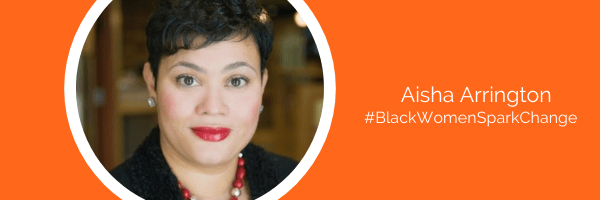
On Aisha Arrington’s first day at the LTC Ombudsman Program, an organization that advocates for people who live in long term care, she wrote on a piece of paper that her dream was to become the Executive Director and “lead from the front.” She folded the note up and placed it in her desk. Within a year she had been promoted to the role, thanks to her own initiative.
After one executive director left and her replacement didn’t show up to do the work, Aisha reached out to the board of directors. They were planning an outside search for a new leader, but she put herself forward, asserting that she’d been doing the job without the title. They agreed to give her a chance, and she’s now been the Executive Director for 13 years.
“You have to know your own self-worth and what you’re capable of doing,” Aisha says. “Unfortunately, I don’t think women are cheered on as much. And we self doubt, maybe more than men do. As women, we have to fight for it. I fought for the position and I got it.”
Elder Rights are Human Rights
The LTC Ombudsman Program, based in Fort Wayne, Indiana, is the largest standalone ombudsman program in the state. When people living in nursing homes or assisted living settings have issues with their care, or questions about their rights, the organization undertakes outreach, such as contacting the facility, attending care plan meetings with the resident and facility staff, and educating residents about their rights.
“It’s basically human rights that we’re advocating for,” Aisha explains. “What I know about an 83-year-old woman in the nursing home, and you or I, is we have a lot more in common than we think. We want to live life to the fullest and experience the best things that life has to offer. The people that we serve in the nursing home, who are often a forgotten community, are just as important as you or I.”
Being a Role Model
As the oldest of five siblings who found themselves in foster care at a young age, Aisha took on the responsibility of advocating for all five, whether it was speaking to judges in court or talking with social workers when one of them needed help. That experience of leading, of being an advocate for herself and others early on, set the stage for a lifetime of personal and professional achievements.
“A lot of the things that I’ve done, I’m the first in my family to ever do,” Aisha says. “And it’s important to me to be the role model that my sister and my daughters can look up to.”
It’s not always easy for relatives to appreciate the accomplishments of a family member. For Aisha, public recognition has showcased her status as a role model. After she graduated with her master’s degree in organizational leadership from Indiana Tech, the university featured her in an ad campaign with billboards and TV commercials.
“We’d be sitting and watching dinner, and then you’d hear me talking,” Aisha says. “My kids would jump up and yell ‘Mom, you’re on TV!’”
Support from Other Women
This past Mother’s Day, Aisha says she reflected on the many ways that day can be difficult for people who have grown up without a mother. “Maybe they have an experience like me, where you didn’t have a mom to dress you up for Halloween, or a mom to nurse you back to health when you’re sick, or a mom to let you know about your period and what to expect. There are a lot of things that I feel like I missed out on because I didn’t have a mother.”
Throughout her life, however, other women have formed an essential support system, including her best friend of 20 years. “To have a friend for that long of a time, you have somebody that knows your life and has been on that journey with you. And so I lean on that relationship a lot. But I’ve always had women, no matter what the role may have been, maybe it was a board member, maybe it was a social worker, maybe it was a past boss, that saw something in me and encouraged me to keep going.”
